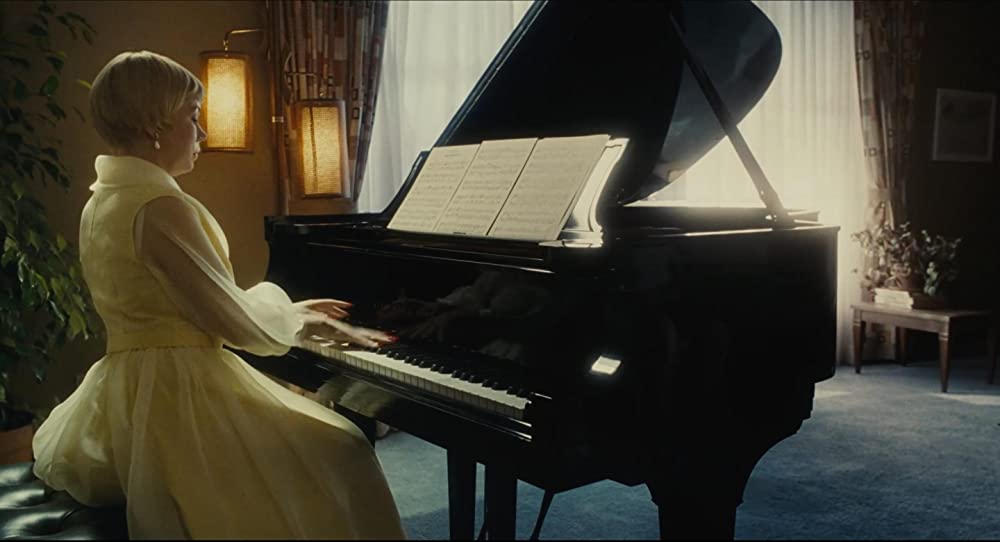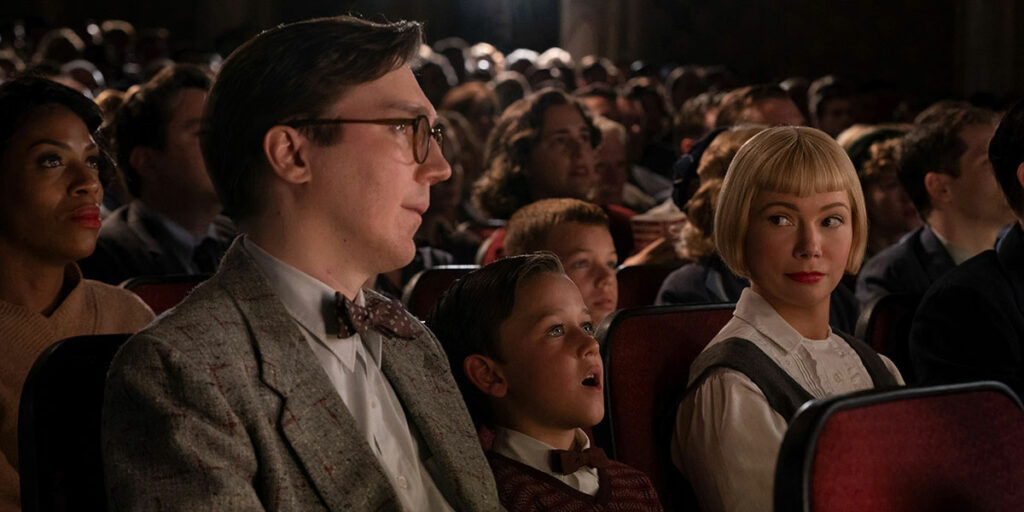Through The Fabelmans, Steven Spielberg delivers a personal and heartfelt, if imperfect, tribute to his family and the formative power of film.
My screening of The Fabelmans is the nicest one I’ve had so far at TIFF, starting with a complimentary breakfast and ending with an interview with Spielberg, Kushner, and the cast. As for the film itself, The Fabelmans isn’t one of my favorite TIFF movies this year, but it’s a heartfelt and intricately crafted tribute to Spielberg’s family and a trip down the formative years of his filmmaking life. Sammy Fabelman (Gabriel LaBelle) is a boy living in post-World War II Phoenix, Arizona with his mother Mitzi (Michelle Williams) and father Burt (Paul Dano). Sammy develops a fascination with film at an early age, and soon he begins making movies himself and showing them to his friends and family. What starts out as a hobby, though, slowly becomes a passionate career ambition, despite Burt’s dismissal of such a prospect. Eventually, one of Sammy’s movies reveals an alarming truth within his family that shatters their stability, and as his high school years begin winding down, he must consider all that he’s discovered to make choices about where his life goes from here.
With the entire film based on real events from Spielberg’s childhood, The Fabelmans is clearly one of if not the most personal film Spielberg has ever done, and I’m really happy that he has the chance to tell a story that means so much to him. But does that translate into it being a good film that can be enjoyed without that knowledge? For the most part, yes, even though the translation of memories and experiences to screenplay and storytelling isn’t seamless. Within the first five minutes of The Fabelmans, you immediately understand the roots of Sammy’s love for film and filmmaking.
You feel both the childlike wonder of discovering a new and exciting way of expressing oneself, but also a way of channeling and overcoming the anxiety and uncertainty of childhood. To craft a scenario and put it on film is to obtain a sense of control over it, which applies first to the simple fears of a very young Sammy when he, say, sees something scary in a movie, but then evolves into something deeper and more essential to him as his family life destabilizes and his internal struggles grow more complicated.
It’s also interesting to see how Sammy’s knack for directing improves, almost in parallel to how the medium as a whole evolved over decades. What starts out as a simplistic form of nonverbal escapism becomes a more concrete and detailed, but still emotionally basic and fun, form of storytelling, before Sammy begins trying to make his work not just a piece of entertainment, but a lifelike, powerful experience that leaves the audience moved and pensive.
The Fabelmans, through the point of view of a budding young director in an older era, breaks down cinema to its very basic roots, reminding us of where it came from and how amazing it is to have evolved. It can tell and expose truths, even ones that weren’t even intended to be captured on the screen, as Sammy’s examination of his work down to the tiniest detail reveals something monumental in his family life that would have otherwise gone completely unnoticed. But the opposite can also be true, as Sammy’s films begin to create their own truths, or at the very least an unreliable window into the truth. We see how he can manipulate one ofhis movies to alter how someone can be perceived, which leads to one of the film’s best scenes as that someone in question laments this phenomenon.

Sammy’s films are very earnest in how crude they are for their budget, but they also show how much skill Sammy has even at an early age. It’s inspiring to compare them to how the real-life Spielberg directs this movie, letting us simultaneously see for ourselves the roots of someone’s filmmaking style and how far someone can come after decades working on a craft. My favorite instance of this is a scene where the family uses their car’s headlights to provide decent “cinematography” for a scene shot at night. It looks pretty through the lens of young Sammy’s camera, but it looks mesmerizing through the lens of Spielberg and cinematographer Janusz Kamiński. It really feels like you’re watching a ghost with starry-eyed reminiscence. The entirety of The Fabelmans, to a lesser degree, has this same shimmering look, fueling the magic and wonder of this past without coming across like it’s over-glamorizing the harsher moments.
Everyone brings exactly what they need to for their performances, flawlessly powering through everything the writing throws at them… even if that writing often turns them into what comes across as bizarre exaggerations of people. As developed as every character is, many of them don’t always feel like real people due to their excessive quirks and sometimes baffling decisions. Taking the brunt of this is Mitzi. Her behavior as portrayed in the film borders on genuine schizophrenia with her extreme whimsy or reckless and unlikeable choices, and I really don’t know whether or not that’s how we’re supposed to perceive her.
A girlfriend Sammy eventually gets has a strong obsession with her religion that comes across more as gimmicky and off-putting than a distinguishing characteristic. The family eventually gets a monkey … I have no idea if that really happened in Spielberg’s household, but its antics just feels so out-of-place in this movie. Let me be clear: I’m not sitting here and saying I know the people in Spielberg’s past more than Spielberg himself, and I don’t mean to insult any of those real-life people. But I think it’s a small failure on the film’s part to not translate those memories in a way that feels believable in the realm of the film.
The Fabelmans also doesn’t always manage its multiple storylines as smoothly as it possibly could have. The focus of the film is one specific aspect for a large stretch, like Sammy’s evolving filmmaking, only to then shift to something else for another stretch, like a family dilemma, only to shift gears again later for when Sammy enters high school and begins dating someone. And while all of these developments are interesting on their own, the way they’re all stitched together can sometimes make The Fabelmans feel unfocused. Similarly to how certain characters are portrayed, I’m sure all of these story threads really happened and were critical to how Spielberg became who he is, but that doesn’t immediately translate into them fitting together well in a coherent narrative. Sammy himself doesn’t even feel like the main character half the time, more so an onlooker. The pacing and length also take a bit of a hit because of this. I would have been fine if a cumulative ten to fifteen minutes were shaved off.
I seem to be in the minority in simply liking The Fabelmans instead of loving it, and that’s totally fine with me. Despite my own issues with the movie, I was still won over by its identifiable lead, intricate look at the art and importance of film, and the happy and tragic personal developments that shape this family for better or for worse. Through his own memories and skill, Spielberg made me feel nostalgia for an era I was nowhere close to being alive in, and he captured the sense of both wonder and fear that comes from being a kid with the whole world ahead of you, trying to cope with troubling developments to find out what you’re meant to do with your life. Clearly he found those answers, as is represented by the film’s perfect wink to the audience in its hilarious final shot. Really, any “critique” I have should just be seen as how I took in the film and not what Spielberg should have done. It’s his story, he should tell it however he feels is best, and I’m glad he got the chance to do so.
The Fabelmans premiered at TIFF on September 16, 2022, and will be released theaters everywhere on Thanksgiving. Read our reviews of Steven Spielberg’s West Side Story, Jaws, Jurassic Park, Ready Player One, Duel, Schindler’s List, E.T. the Extra-Terrestrial, and The Terminal, and find out why Catch Me If You Can is a Christmas Movie.

